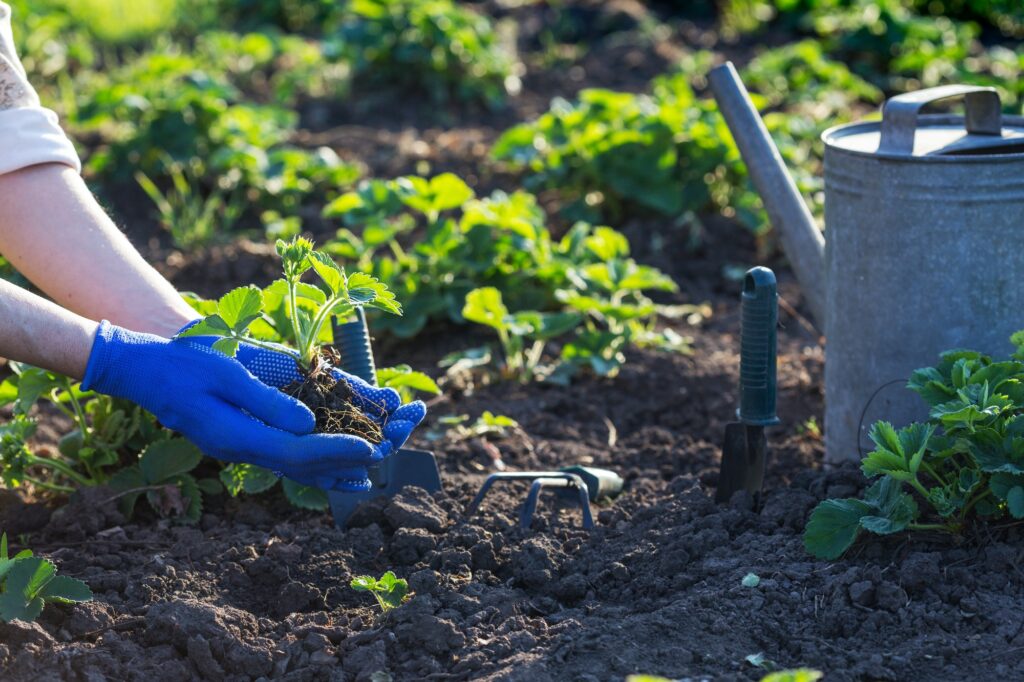From January 1st 2019, the sale, use and storage of chemical pesticides, fungicides and herbicides for use in your garden will be prohibited. This follows restrictions already in place (since the beginning of 2017) for this category of product in public gardens, but leaves their broader use in agriculture and farming unchanged – for the moment.
Examples of products to say goodbye to
The French description of what is being banned is des produits phytosanitaires de synthèse. This umbrella term refers to man-made chemicals that are used to manage the health of plants. This therefore includes anything that controls plant disease, insect infestation and predation, mildew and fungus, and encourages growth such as chemical fertilisers. It includes practically anything that is laboratory-made (synthetic, as opposed to natural) which we use to give a helping hand to our lawns, plants, shrubs, vegetables, fruits and trees.
This ban does not include natural or organic products; this ban is designed to encourage us to transition from the chemical to the organic.
It has already been estimated that between 5% and 10% of all pesticides in use in France has been in private gardens. That may not be much. But the scale of the problem should not be under-estimated. There are two areas of concern, at least: the damage these chemicals do to us, and the damage they do to wildlife and the environment. As we get used to running our gardens without these categories of chemicals, it may help to acknowledge the risks that we’ve become used to taking.
Reducing the human health risks
Monsanto’s Roundup weed killer was introduced back in 1974. Only now, after 40 years of use in agriculture – and in our gardens – has extensive US government testing established that glyphosate-based herbicides effectively “decrease human cell viability”, disrupting cell membranes. In 2015, the International Agency for Research on Cancer classified glyphosate as a probable human carcinogen.
An internal Monsanto email written in 2002 said: “Glyphosate is OK but the formulated product … does the damage.” The UK’s Guardian newspaper has a detailed report on this scandal.
Using natural alternatives makes sense for us.
Reducing environmental and wildlife damage
According to France’s l’Agence de l’environnement et de la maîtrise de l’énergie (Ademe), the use of these chemicals has contaminated our soil and diminished biodiversity. According to Ademe, private gardens are on course to pollute a quarter of our surface water and the underlying water-table. That has a major impact upon the natural world in which we live.
Hardly anyone can have failed to notice the dramatic drop in wild bird numbers and the progressive loss of long-cherished bird species. By polluting the surface water and poisoning the insect life that depends upon it, our feathered co-habitants have taken the hit. And our butterflies . . . and on and on . . .
Using natural alternatives makes sense for our environment.
Alternative approaches
Instead of chemical fertilisers, try natural fertilisers. Have you ever made fertiliser from nettles? The smell is grim, but it gets the green shoots growing.
Instead of pesticides, try biological pest control. Have you ever used ladybirds to overcome mealy-bugs? Or nematodes to attack vine weevils or slugs? Or pheromone traps to lure parasitic insects?
- Jardiner Autrement has an excellent page of advice on gardening without pesticides.
- La Société Nationale d’Horticulture de France offers the ultimate French collection of resources on biological pest control.
- Britain’s Royal Horticultural Society has a page of advice on the subject.
Adopt tried-and-tested gardening methods such as straw-mulching for weed and slug suppression and inter-planting for pest and disease management (visualise roses amongst vines).
Disposing of your old chemical products
As you begin to replace your garden chemicals with ones that are kinder both to the environment and to ourselves, be careful about how you dispose of these older products. They cannot just be poured down the drain or thrown in the bin. Your local déchetterie will be equipped to process them, as may your local garden centre. Take them there.
The information provided here is for general guidance. The exact details of your policy will define your legal and contractual obligations. What is written there will take precedence over what is written here.
Ces informations sont données à titre indicatif. Pour connaître précisément vos obligations légales ou contractuelles en relation avec votre contrat d’assurance, veuillez vous référer aux conditions générales et particulières de votre contrat.

